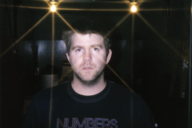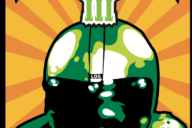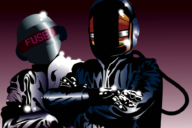ROYAL BLOOD: YOU CAN EASILY HIDE BEHIND THE NOISE
Ben Thatcher is talking about songwriting. Refreshing and perhaps surprising coming from someone who, to the discerning ear, is just another voice from another noisy iteration: “You can very easily hide behind the noise” Ben explains, “but we like to strip it back – create a true melody. Good writing sets you apart. People appreciate it more. It gets you on the radio, gets you gigs.”
Since forming in early 2013 Ben Thatcher and Mike Kerr, both from Brighton, and the extreme talent that is Royal Blood, have created a sound that leaves little room for comparison. As easy and perhaps justifiable as it may seem, it wouldn’t be fair to label Royal Blood as just another two-piece formula. Admittedly they’ll “Listen to almost everything and anything by Jack White,” but this shouldn’t automatically tarnish their reputation for raw innovation. Given their sudden (though much deserved) leap into the treasured fold of many a respected critic – and not to mention their listeners – it’s obvious the music speaks for itself.
Rises and falls, keels and drops, Royal Blood are a continuous blood-flow of change, activity, and progress. They’re not traditional – yet somehow they sound authentic. They experiment skilfully with dynamics, levels – even extensions of sound and time. When you piece it all together, and listen to the result, it’s quite a beautiful thing to behold. There are echoes of Zeppelin and The Pixies; which I guess is their line of musical inheritance. Still, they’re a difficult pair to pigeonhole.
So how do they do it? There’s nothing introverted about Royal Blood. But this doesn’t mean they don’t carry subtly, or weight. They’re a rock band, and inevitably Blues is at the heart of what they do. It’s there in the melodies and naked as a baby in the lyrics. This gives them a sense of purity; their dirty riffs, a primal intensity. When asked about the creative process Ben immediately launches into the value of unravelling something popular but unique – particularly in sound: “Mike (Kerr) is fascinated with it. He’s not a bass player in the traditional sense. He plays somewhere between the guitar and the bass, and merges the two.” Their music, for all its noise, is intricate, and melodic. They’re a team working to opposition and tension. They drive each other. Their sound is, by its very nature a wave of noise – continuous but corrugated, and as blunt as it is hypnotically consistent: particularly noticeable in their early track Figure it Out. “Basically I follow Mike” Ben admits. His playing is protractedly directed, almost progressional. He handles the kit like the sun handles the dial – naturally, and with rotational ease.
But it isn’t just their ability to experiment. These two have a strong emotional and creative connection – you can see it when they perform and hear it in the music. Is it their friendship that makes the bedrock for such a tight working relationship? “Yes” is the answer, “we’re friends first, co-workers second. We grew up listening to stuff together, discovering new bands together, learning to play together.” He describes the way they work as a creative struggle: “I basically follow him (Mike), and it’s a physical battle.”
The key word here is ‘physical’ – this is without doubt what gives the duo so much power. The chemistry between them is tangible, and the sound too, almost Herculean. Combined Ben and Mike are an echo of everything they adore embodying what they love about rock, riffs, rhythm, lyric and pouring it into their sound: “Our style is loyal to us ….we have three amps, a few pedals, a bass, and a drum-kit, and we write songs.” This is what makes them so good. These guys love the words as much as they love the noise – this is the combination that makes ‘the music.’ They put equal energy into the composition of both. And what’s more they do it well.
But is there enough of this to go around? For some it might seem the great British Music Industry is fading. Sinking, quite ignorantly/blissfully under a slow, ordinary blanket of death. For Ben: “It’s actually getting better. It’s becoming more inventive, and there’s some great talent out there. It’s not about being in competition. It’s about supporting each other – to share what you do with everyone else.” Are we working towards another golden era for music in the UK? “Ask me in ten years” Ben replies “you can only know something like that when you look back.” He was however surprised to find that Royal Blood were the only band featured on the BBC’s Sound of poll: “everyone else was a singer-songwriter. This was disappointing. It would be nice to see more bands stepping up.”
Similarly to The Arctic Monkeys, Royal generated sound-space for the fruits of their musical collaboration off the back of social media websites – Soundcloud, namely, which they still intend to use to circulate interest: “We don’t need to go back to that way of doing things, we just need to keep using it.” Crucially, Ben thinks it’s about generating music for music’s sake. Online portals such as Soundcloud are systematically dedicated to getting the music out there, formatting the mix and making it accessible. You’re only really bombarded with sound and this is a good thing. Truthfully, there’s some god-awful tripe uploaded every second on every inch of the web. But there’s also some wonderfully edgy stuff. It only takes a bit of patience to find it – and the same goes for generating the music we want to hear. There’s genuine skill of course, and hard-work, something Royal Blood have in abundance.
Royal are explosive. To do what’s right by them is to keep channeling their artistic energies into the raw flounder of their – as yet – untouchable sound.
Helen Calcutt








